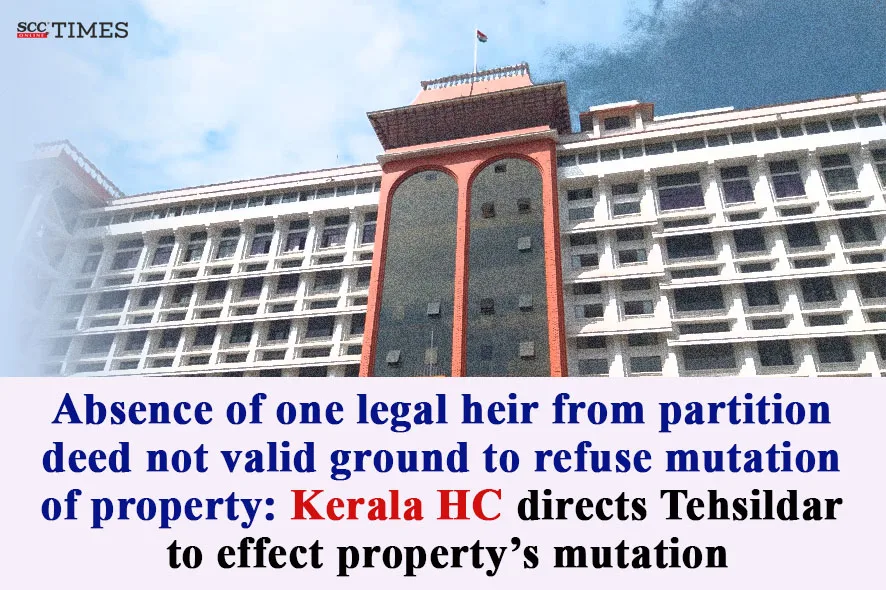Kerala High Court: The present petition was filed by the petitioner seeking mutation of his allotted share in the property, based on a registered partition deed executed among the parties, as the Tehsildar had refused to grant the request stating one of the legal heirs (‘excluded sharer’) was absent from the partition deed. A Single Judge Bench of C. Jayachandran, J., while allowing the petition, directed the Tehsildar to effect mutation in respect of the property allotted to the petitioner’s share, holding that the absence of one legal heir from the partition deed was not a valid ground for refusing mutation.
Background:
A partition deed was signed among the parties, on the strength of which, the petitioner sought the mutation of the property allotted to his share. The Tehsildar refused the request stating that one among the legal heirs was left out in the partition deed.
The petitioner’s counsel submitted that the excluded sharer was estranged from the family, and he did not join the partition deed, yet a property was earmarked to his share via the same deed. He contended that the non-joining of one of the parties could not be a matter which could be taken stock of by the Tehsildar to refuse the mutation, especially when a property was already earmarked to the excluded sharer. He submitted that refusing mutation was not the remedy, and if the excluded sharer was aggrieved by his exclusion in the execution of the partition deed, he could take appropriate action as per law.
However, the respondents’ counsel submitted that although the excluded sharer had filed an objection to the mutation sought by the petitioner, he did not turn up before the Tehsildar, despite issuance of notice on three occasions. He further submitted that it was based on the complaint preferred by the excluded sharer that the mutation was refused.
Analysis and Decision:
The Court noted that the excluded sharer did not make a representation before the Court even after being impleaded as an additional respondent. The Court opined that if the excluded sharer had any grievance, it was for him to take appropriate actions which included either to get the partition deed set aside or to seek such other remedies. If no such action was taken, it was not for the mutating authority to safeguard the interests of the excluded sharer.
The Court noted that the petitioner sought mutation only in respect of his allotted share and that a share was earmarked to the excluded sharer as well, even though the same might not preclude the rights of the excluded sharer to challenge the partnership deed. The Court observed that mutation could not be refused merely on the ground that one among the parties had not joined the partition deed.
Accordingly, the Court allowed the petition and directed the Tehsildar to expeditiously effect the mutation in respect of the petitioner’s share in the property within a period of one month.
[Rajendran Ashari R. v. State of Kerala, WP(C) No. 41687 of 2024, decided on 07-10-2025]
Advocates who appeared in this case:
For the Petitioner: Raj Carolin V., Advocate.
For the Respondents: Deepa Narayanan, Sr. Government Pleader.



